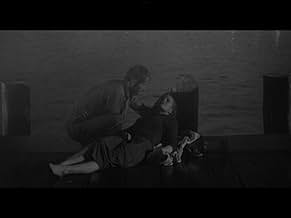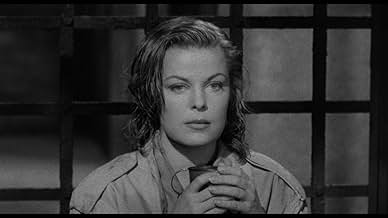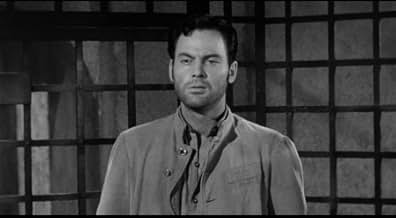Ajouter une intrigue dans votre langueA condemned murderer, scheduled to hang in the morning, asks for the company of a woman in his final hours.A condemned murderer, scheduled to hang in the morning, asks for the company of a woman in his final hours.A condemned murderer, scheduled to hang in the morning, asks for the company of a woman in his final hours.
- Director
- Writer
- Stars
Avis en vedette
This is my favourite performance from the otherwise rather sterile John Agar. He is "Joe", on death row having been found guilty of strangling three women. He's decided to go out in Garbo style, wanting to be alone and angrily resisting any attempts from his family, or the priest, to comfort him as the big day nears. With twenty-four hours to go, though, he decides that the "company" of a lady might help ease his burden and obliged to help him out, the prison manage to recruit "Dora" (Cleo Moore). Now she's not in a very good place either - indeed had earlier tried to jump in the river; so a few dollars for a quickie with "Joe" didn't seem such a bad offer. Whilst there is certainly a predictability about the latter portion of this drama, it's still performed well and is tautly directed by Hugo Haas. Moore delivers an impassioned effort, indeed in many ways her character is far more intriguing than the sorry-for-himself "Joe". It is a bit dialogue-heavy, but for the most part that dialogue is worth listening to as we head towards the expected denouement - expected on just about every level. It does sail perilously close to melodrama at times, but it has a compensating grittiness and realism that I felt made this a much better than average tale to tell. You probably won't remember it for long afterwards, but it's enthralling enough when you watch.
John Agar is about to be executed for murder. It's his last night, and he can have anything he wants. He asks for a woman to spend his last night on earth with him. He winds up with Cleo Moore, who has just been rscued from trying to drown herself in the river.
Hugo Haas has written a very interesting two-player drama. He cast his frequent star, Cleo Moore, and for some reason, John Agar. It's an hour of their talking emotionally. Unfortunately, neither is particularly convincing nor interesting.
Has spent about a dozen years writing, producing, and directing his own movies. When he was finished, he sold them to a distributor -- here it's Universal -- and move onto the next. Generally they were dark, gloomy noirs, variations on other pictures that went in some unexpected direction. Had he gotten better actors, this could have been a very good movie. Alas, as it is, it's more interesting for the idea than the execution.
Hugo Haas has written a very interesting two-player drama. He cast his frequent star, Cleo Moore, and for some reason, John Agar. It's an hour of their talking emotionally. Unfortunately, neither is particularly convincing nor interesting.
Has spent about a dozen years writing, producing, and directing his own movies. When he was finished, he sold them to a distributor -- here it's Universal -- and move onto the next. Generally they were dark, gloomy noirs, variations on other pictures that went in some unexpected direction. Had he gotten better actors, this could have been a very good movie. Alas, as it is, it's more interesting for the idea than the execution.
I admit it. I feel a strange fascination (to borrow one of his titles) for the films of Hugo Haas, written, produced and directed by, and starring. I know. They are B movies. He could not command Hollywood's elite. But he had his stock company - Cleo Moore, Beverly Michaels, Jan Englund, Anthony Jochim - just as John Ford had his. His cinematographers, Paul Ivano, Edward Fitzgerald, were craftsmen. His work is idiosyncratic. At its best it is unique and memorable. He was a Jew who escaped the Holocaust while his brother, left behind, disappeared into Auschwitz. He was a man of European sensibility floundering in America. His stories are studies in irony. Some bear the bitter irony of Guy de Maupassant, others the tender twists of O. Henry. He puts his character, a lonely middle-aged man on the downside of life, in the way of his passionate women. He sounds a pervasive note of sadness. The devastating ending of "The Girl on the Bridge" remains for me second only, in its crushing irony, to Vincent Sherman's "The Hard Way." I don't know why, of all the independent filmmakers of the classic era, he gets the least respect.
"Hold Back Tomorrow" is one of the best and certainly the strangest of Hugo Haas' films. Who else would fashion a film almost all of which consists of two people, a man and a woman, talking? They are alone, locked in a death row cell during his last hours on earth. It is a two-person play. The camera just happens to be there. She is weary of a futile and friendless existence. He awaits an unjust fate. They contemplate death. Twenty years earlier Jean Cocteau wrote a one-person play, "The Human Voice," a monologue of despair. One actress, a suicidal woman, talks into a telephone. Francis Poulenc made it into an opera. OK. Hugo Haas was not Cocteau. But he knew the play. In "Hold Back Tomorrow" he wrote a dialogue of despair. Joe has never been able to cry. He cries. Dora has never been able to smile. She smiles. Myself, my eyes are seldom able to drop tears. They were moist.
Neither not-quite-Marilyn-Monroe Cleo Moore nor post-Shirley-Temple John Agar rose to the heights of stardom. Sometimes artists rise to the heights of artistry if they are given the material to inspire it. This material inspired artistry in Cleo Moore and John Agar. Everything, the story, the emotions, must come from them, their actions and reactions. Singers sometimes talk of being naked in the music. That is, they have only bare accompaniment that leaves them exposed. "Hold Back Tomorrow" leaves its actors exposed. They are alone before the camera. Cleo Moore never got the appreciation she deserved. She is heartbreaking when she delivers, at his request, in sadness a wan smile. John Agar makes us feel his emotional release, his catharsis, when he finally weeps after having vowed fiercely that he would never cry. In the end, Dora and Clara pray for a miracle. Hold back tomorrow is the title and the song. It is also the prayer: the hangman's rope will break; Joe will live. It won't break. We know. But maybe God will grant Joe the mercy of an illusion. Will he, in his last instant of consciousness, feel it break,dream that it has broken, and he has returned to Dora? He has already imagined it. He tells her. He has imagined the breaking of the rope. Hugo Haas hints at another ironic storyteller, Ambrose Bierce, and a cruelly ironic tale, "An Occurrence at Owl Creek Bridge." Bierce's hero feels the rope break, though it doesn't. He dreams, in a last instant, that he is free. Joe enters the death chamber. The clock chimes. The dream could be another movie. If I am guilty of overthinking and overpraising a Hollywood B picture, so be it.
Hugo Haas and Cleo Moore, who played in seven of his films, came, I am sure, to form a bond - she a struggling actress from Louisiana who never made it to the A list, he a major artist in his native country now relegated to petty parts in forgettable movies. They shared a complicity born of sympathy and frustration. In "The Other Woman," their fifth collaboration, Haas played what he was, a luckless actor turned director, Cleo a struggling actress under his direction. He wrote these lines of himself: "He was a big star in Europe. Here he played bit parts, just nothing." He wrote these lines for her: "I've got more talent than all those overpublicized dames ... What did you expect, to pay my way back to Louisiana and give me five bucks for expenses?" In "Hit and Run," her last film for him, her last film for anyone, she addresses her last line to his character: "Goodbye, Gus."
"Hold Back Tomorrow" is one of the best and certainly the strangest of Hugo Haas' films. Who else would fashion a film almost all of which consists of two people, a man and a woman, talking? They are alone, locked in a death row cell during his last hours on earth. It is a two-person play. The camera just happens to be there. She is weary of a futile and friendless existence. He awaits an unjust fate. They contemplate death. Twenty years earlier Jean Cocteau wrote a one-person play, "The Human Voice," a monologue of despair. One actress, a suicidal woman, talks into a telephone. Francis Poulenc made it into an opera. OK. Hugo Haas was not Cocteau. But he knew the play. In "Hold Back Tomorrow" he wrote a dialogue of despair. Joe has never been able to cry. He cries. Dora has never been able to smile. She smiles. Myself, my eyes are seldom able to drop tears. They were moist.
Neither not-quite-Marilyn-Monroe Cleo Moore nor post-Shirley-Temple John Agar rose to the heights of stardom. Sometimes artists rise to the heights of artistry if they are given the material to inspire it. This material inspired artistry in Cleo Moore and John Agar. Everything, the story, the emotions, must come from them, their actions and reactions. Singers sometimes talk of being naked in the music. That is, they have only bare accompaniment that leaves them exposed. "Hold Back Tomorrow" leaves its actors exposed. They are alone before the camera. Cleo Moore never got the appreciation she deserved. She is heartbreaking when she delivers, at his request, in sadness a wan smile. John Agar makes us feel his emotional release, his catharsis, when he finally weeps after having vowed fiercely that he would never cry. In the end, Dora and Clara pray for a miracle. Hold back tomorrow is the title and the song. It is also the prayer: the hangman's rope will break; Joe will live. It won't break. We know. But maybe God will grant Joe the mercy of an illusion. Will he, in his last instant of consciousness, feel it break,dream that it has broken, and he has returned to Dora? He has already imagined it. He tells her. He has imagined the breaking of the rope. Hugo Haas hints at another ironic storyteller, Ambrose Bierce, and a cruelly ironic tale, "An Occurrence at Owl Creek Bridge." Bierce's hero feels the rope break, though it doesn't. He dreams, in a last instant, that he is free. Joe enters the death chamber. The clock chimes. The dream could be another movie. If I am guilty of overthinking and overpraising a Hollywood B picture, so be it.
Hugo Haas and Cleo Moore, who played in seven of his films, came, I am sure, to form a bond - she a struggling actress from Louisiana who never made it to the A list, he a major artist in his native country now relegated to petty parts in forgettable movies. They shared a complicity born of sympathy and frustration. In "The Other Woman," their fifth collaboration, Haas played what he was, a luckless actor turned director, Cleo a struggling actress under his direction. He wrote these lines of himself: "He was a big star in Europe. Here he played bit parts, just nothing." He wrote these lines for her: "I've got more talent than all those overpublicized dames ... What did you expect, to pay my way back to Louisiana and give me five bucks for expenses?" In "Hit and Run," her last film for him, her last film for anyone, she addresses her last line to his character: "Goodbye, Gus."
"Hold Back Tomorrow" is one of the stranger films I've ever seen. Not bad at all...just very strange. And, it's because the film is so unusual that I recommend you see it.
When the story begins, Joe (John Agar) is on death row...a day before his scheduled execution. Unlike most prisoners in such situations, Joe is not repentant and wants everyone to just shut up and leave him alone. But, after the warden offers to give him ANY last request, Joe decides he wants to have a woman spend his final hours with him. While this sounds like he wants to get some, he just wants someone to talk to.
At the same time, a seriously depressed woman tosses herself into the river. She is saved...and yells at the stranger who saved her. Ultimately, she is the woman who is asked to spend Joe's final night with him in his prison cell.
This is a very odd film. On one hand, the plot is completely ridiculous as wardens do NOT offer the condemned ANYTHING they want...no questions asked! And, having a stranger spend a the night with the condemned...well, that sure isn't gonna happen! But if you can suspend disbelief, the film is amazing. First, while about 95% of the story consists of the pair just talking in one room, it's never boring. Second, for years, John Agar has been known as one of the worst actors alive. But here, with the right material, he shows his acting chops. After playing most of the story angry in a one-note performance, later he changes and his depth of talent shows. Cleo Moore is also quite good as the girl. Overall, a film which really works once you stop worrying about the improbability of it all. A really nice low-budgeted movie...one which I almost gave a 9.
When the story begins, Joe (John Agar) is on death row...a day before his scheduled execution. Unlike most prisoners in such situations, Joe is not repentant and wants everyone to just shut up and leave him alone. But, after the warden offers to give him ANY last request, Joe decides he wants to have a woman spend his final hours with him. While this sounds like he wants to get some, he just wants someone to talk to.
At the same time, a seriously depressed woman tosses herself into the river. She is saved...and yells at the stranger who saved her. Ultimately, she is the woman who is asked to spend Joe's final night with him in his prison cell.
This is a very odd film. On one hand, the plot is completely ridiculous as wardens do NOT offer the condemned ANYTHING they want...no questions asked! And, having a stranger spend a the night with the condemned...well, that sure isn't gonna happen! But if you can suspend disbelief, the film is amazing. First, while about 95% of the story consists of the pair just talking in one room, it's never boring. Second, for years, John Agar has been known as one of the worst actors alive. But here, with the right material, he shows his acting chops. After playing most of the story angry in a one-note performance, later he changes and his depth of talent shows. Cleo Moore is also quite good as the girl. Overall, a film which really works once you stop worrying about the improbability of it all. A really nice low-budgeted movie...one which I almost gave a 9.
First, this is not a film noir, nothing to do with crime, but a noir drama, yes, of course, how could it be otherwise? Director Hugo Haas is a film maker whose filmography should be discovered again. After a brief European career, before he escapes from Nazis, he went to the USA and began a second part. And he never made something different from drama. All those films are rather gloomy, desperate, forget any happy ending - as far as I know. All those films involve women - more or less fatale chicks - and engrossing plots, gripping, for not too long films. His films are nearly all alike but who cares? I definitely like his films.
Le saviez-vous
- AnecdotesHugo Haas - who wrote, produced, directed and acted in most of his movies - doesn't appear in this film.
- ConnexionsReferenced in The Ultimate Degenerate (1969)
- Bandes originalesHold Back Tomorrow
Music by Franz Steininger
Lyrics by Johnny Rotella
Arranged and Conducted by Les Baxter
Meilleurs choix
Connectez-vous pour évaluer et surveiller les recommandations personnalisées
- How long is Hold Back Tomorrow?Propulsé par Alexa
Détails
- Durée1 heure 15 minutes
- Couleur
- Rapport de forme
- 1.37 : 1
Contribuer à cette page
Suggérer une modification ou ajouter du contenu manquant

Lacune principale
By what name was Hold Back Tomorrow (1955) officially released in India in English?
Répondre


























